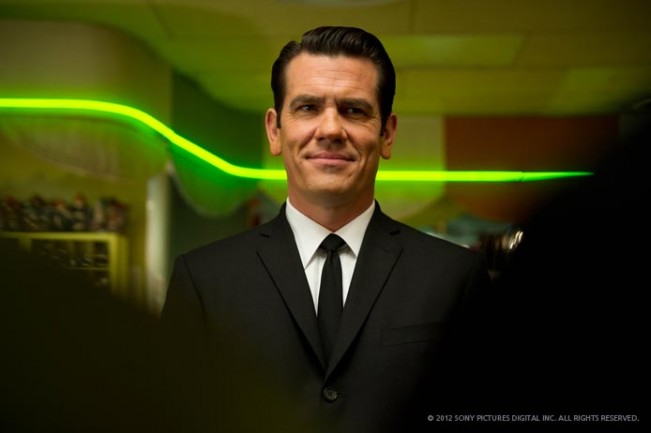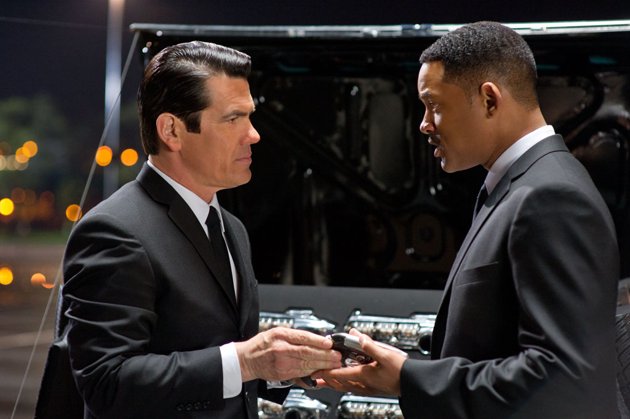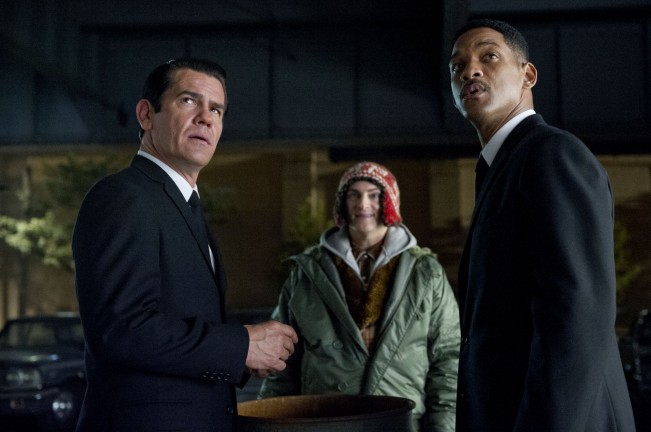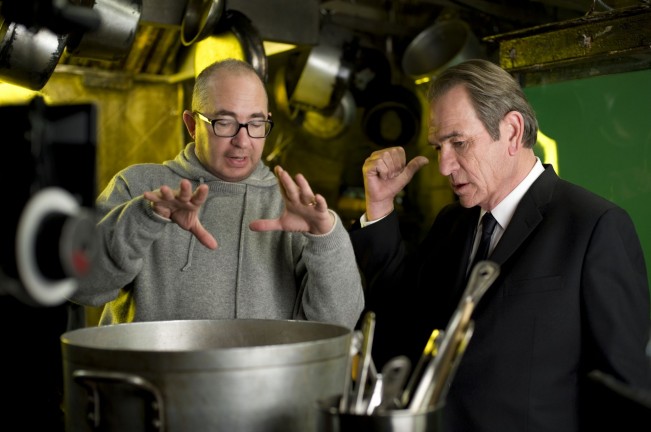

By Mike Wilmington Wilmington@moviecitynews.com
Wilmington on Movies: Men in Black III
MEN IN BLACK III (Three Stars)
U.S.: Barry Sonnenfeld, 2012
I. MIBx3
Movie Sequels don’t always work, and the bad ones tend to diminish our fonder memories of some of the originals. But a good sequel can increase our pleasure, sweeten our memories. Men in Black III is the third in the series that started back in 1997 and has now produced one bad sequel (Men in Black II) and one good one (Men in Black III). Win a few, lose a few, as Agent K might say.
The first film, plain old Men in Black, was a flashy, tongue-in-several-cheeks science fiction comedy with great wacky visual effects, that introduced Will Smith‘s buoyant Agent J to Tommy Lee Jones’ gloomy Agent K.
J. and K. were two pros in the most hush-hush of top-secret government agencies: the that monitors or tracks down bizarre space aliens and extraterrestrial monsters secretly among us — and it was first sequelized ten years ago back in 2002. I liked the first movie, disliked the second, and wasn’t especially looking forward to the third, even though I’m usually partial to movies that employ Tommy Lee Jones. But Men in Black III works pretty well. You never can tell, as Chuck Berry once said.
One of the big plusses in the original MIB was the casting. As a pair of impeccable Feds in matching black suits and Ray-bans, sporting unusual weaponry and a Dragnet disregard for the niceties, Mr. Smith and Mr. Jones made up one of the most unusual and effective comedy-action teams of the ‘90s. They were a knockout pair, when the movies let them be (MIB2 mostly didn’t) — Smith and his hang-loose fresh-kid boyish/hip mannerisms and Jones and his dour deadpan mug, his cutting remarks and his West Texas twang. Urban black and Southwestern white. And they played off each other beautifully, with a playful seriousness that heightened the whiz-bang nuttiness of the story around them.
They also played well off the Mad Magazine gallery of comical space freaks concocted by effects/makeup genius Rick Baker and others — weirdo beings who talked like hip outlaws, looked like second generation vets of the cantina scene in Star Wars, and who were cleverly disguised as human beings, a disguise that Smith’s J and Jones‘s K could always penetrate.
The series has been variable — even though director Barry Sonnenfeld and some crucial cogs of the company have rejoined Smith and Jones all three times. But MIB3 is certainly a good picture, light years better than MIB2, which came out with a thud ten years ago. (I have reservations about MIB3, and I’ll get to them later.)
II. THEN AND NOW
This time Smith plays Agent J again, but there are two Agent Ks: Jones, of course, as the contemporary K, and Josh Brolin as the young (29-year old) K — whom we meet when Agent J travels back in time, to 1969, to keep K from being killed by an extraterrestrial Boglodite monster named Boris the Animal (Jemain Clement), a nasty bully who has designs on conquering Earth as well. Boris’s first foray into world-beating ended when Young K caught him after Boris went on a space alien-murdering spree back in 1969, K thus warding off a cataclysmic Boglodite invasion, and imprisoning Boris the Animal for 40 years of snarling isolation in a maximum security facility on the moon.
Now Boris the Animal (the nickname always gets him mad) has escaped, thanks to his slinky girlfriend (Nicole Scherzinger) and a pretty lively cake — in a scene that vaguely recalls Hannibal Lecter’s bustout in The Silence of the Lambs, if Hannibal were an iguana-looking dude with bad hair (I mean really bad hair) who had murderous insects popping out of his hands like evil cucarachas. Boris is incensed not only that K caught him and sent him to jail, but that he blasted off his left arm too — and so the mad villain (who sounds like Darth Vader with gravel in his mouth) cobs a compact time machine from geek N.Y. cut-rate electronics shop owner Jeffrey (Michael Chemus), so he can whiz back and eliminate K before that arm was lost and incidentally conquer the earth — something Boris now has planned carefully to coincide with the last part of this movie.
 Agent J discovers all this after a few J-K banter scenes at the start and after K mysteriously disappears the next morning, mysteriously forgotten by almost everybody at the agency, and J discovers that, according to the records, even though he just saw and sparred with K yesterday, his partner is listed as killed in action, by Boris the Animal, 40 years ago — before J and K met (we think), before K recruited them for the agency, and before Boris‘ armies began massing for the last attack and the big FX blowout. One person remembers K: Agency head O (Emma Thompson) — who has replaced the deceased Z (played in MIB1 and MIB2 by the estimable Rip Torn, maybe absent here because of banking problems). O is an old pal of K’s, maybe more, and she fills in some blanks and lets J take off, via another of Jeffrey’s pocket time machines, to try to stop Boris and set everything right. (Why she sends only one guy to save the world is another mystery, but we‘ll let it pass, mostly because we like Will Smith, and we know he won‘t let us down, especially in a movie like this.)
Agent J discovers all this after a few J-K banter scenes at the start and after K mysteriously disappears the next morning, mysteriously forgotten by almost everybody at the agency, and J discovers that, according to the records, even though he just saw and sparred with K yesterday, his partner is listed as killed in action, by Boris the Animal, 40 years ago — before J and K met (we think), before K recruited them for the agency, and before Boris‘ armies began massing for the last attack and the big FX blowout. One person remembers K: Agency head O (Emma Thompson) — who has replaced the deceased Z (played in MIB1 and MIB2 by the estimable Rip Torn, maybe absent here because of banking problems). O is an old pal of K’s, maybe more, and she fills in some blanks and lets J take off, via another of Jeffrey’s pocket time machines, to try to stop Boris and set everything right. (Why she sends only one guy to save the world is another mystery, but we‘ll let it pass, mostly because we like Will Smith, and we know he won‘t let us down, especially in a movie like this.)
Along the way, Smith proves again that he can hold his own with anyone, and that he can make almost anything seem real by the engaged, if occasionally mystified, way he reacts to it. The movie has a few knockout scenes before the big smash Cape Canaveral climax — car and motorcycle chases and leaps off the Chrysler building and such — and J meets a colorful gallery of people and monsters, including a Chinese man-fish named Wu (Keone Young), the most outlandish bowling alley crowd since The Coen Brothers’ The Big Lebowski; Bill Hader playing Andy Warhol at a Factory party (no kidding) with The Velvet Underground on the record player; a blissed-out, blue-eyed, homeless-looking E.T. in knit cap and parka named Griffin (Michael Stuhlbarg of The Coen Brothers’ A Serious Man), who can identify and unravel any PhilDickian alternate time paradox in seconds, and is responsible for some really tender, moving moments here (especially if you‘re a New York Mets fan); and, yet another Coen Brothers veteran, Brolin (of No Country for Old Men, which also had Tommy Lee Jones) as the younger, more genial Agent K.
As everyone, or almost everyone, has already said, Brolin turns out to be the perfect actor to play (we won’t say “channel”) a younger edition of Tommy Lee Jones. He has the San Saba voice, the cold dark eye, the racing gab, the “don’t-mess-with-me” manner, the seemingly even emotional temperature (maybe boiling underneath), the bunched-up football player’s stance, even some of the look. But Brolin is not playing simply a copy of Jones’ K. He‘s playing K as he might have been, or was, as a young man, before something happened that soured and chilled him a little (we’ll see it). He‘s a K with less world-weariness and more joie de vivre than his older self, and a genuine smile that keeps lighting up his mug at moments. Jones and Brolin acted together (though in different parts of the movie) in No Country for Old Men, and they seemed kindred spirits there and here –so much so that their joint portrayal of Agent K actually begins to seem like one continuous performance. A great one. Or at least great for a movie like Men in Black III.
A solid chunk of the old MIB team is back even though it’s been fifteen years since they were all first assembled: Smith and Jones and director Sonnenfeld, back in his playful moving-camera groove (and didn’t he work for the Coen Brothers a few times too?) and composer Danny Elfman and creature guy Baker, and it‘s nice to see them all again, or see their work, and not have to be looking at Men in Black II. The structure of MIB3 — monster or maniac goes on the loose, pursued by heroes, a couple of smaller action scenes leading to the big deal, Holy-Toledo-they’re-not-doing that! smasheroo climax, the one with lives or planets or opening weekends in the balance — is pretty much the same ironclad format as most big-bucks action movies. But, in MIB3, these action scenes never outstay their welcome; they aren’t allowed to consume the movie, Michael Bay style. They’re exciting and absurd of course, what can you expect, but the movie has so much character and comedy stuff that it keeps us — or at least the adults and the smarter kids in the house — from revolting.
III. THE FOUNTAIN OF YOUTH, RECONSIDERED

Now my reservations. Bear with me. As I said, everybody agrees that Josh Brolin does a great job of impersonating a young Tommy Lee Jones. Me too. And writer Etan Cohen has concocted a way to make it all acceptable and likable and (strange to say this about a movie with a talking fish and invasions from outer space and a space alien’s head that gets used as a bowling ball) even somehow credible.
But why was it deemed so necessary to figure out a way to get a young Tommy Lee Jones K part, played by a younger actor, even if it was the right younger actor, into the picture? Tommy Lee Jones is 65 years old, not really that old by today’s standards. (60, they say, is the new 40.) I’ll bet he can still play football, at least with other 50 or 60-year-olds, and he was once all-ab all-conference offensive guard at Harvard. No offense, but I’d certainly rather watch Jones in a movie than, say, Robert Pattinson (yeah, I know he played Salvador Dali) or Taylor Lautner or Ashton Kutcher, or Josh Duhamel, or, for that matter (most of the time) higher talents like Jesse Eisenberg, Seth Rogen, Shia LaBeouf or Jonah Hill. And that goes for everyone else good from the Gene Hackman-Meryl Streep-Morgan Freeman-Dustin Hoffman generation, or earlier, or a little later, including a lot of people we don’t see much anymore, or will never see, because the roles aren’t there.
Here’s what Ty Burr had to say in his Boston Globe MIB3 review about the philosophy behind the MIB3 casting. (I realize he’s being ironic and critical and mocking the attitudes he‘s describing.) “(In Men in Black III), as far as the studio sees it, everybody wins. Tommy Lee Jones gets a paycheck and a vacation, while the young audiences of America are spared the horror of spending 106 minutes with an old person.” The horror? As I said, irony. But probably true, too. Isn’t what Ty is describing and satirizing as studio box-office-think, really there and really just simple cultural bigotry — especially in a time when lots of people are living (and watching movies) into their 90s? Why is ageism tolerated and indulged so widely in the movie industry, by people who would never be caught dead being guilty, or thought guilty, of racism or sexism or classism? Is it the hip “ism?” (“Never trust anyone over 30,” Abbie Hoffman once said, to his eventual regret.)
Many movie stars have always been young. Youth and beauty are what the movies have traditionally sold — or a part of what they sold. But in what we now call the Golden Age, there were plenty of movies about older people, acted and written and made by older people, and, in addition, a big majority of all the movies released were about adults, and adult concerns, and nobody thought they were violating sacred (or even profane) box-office rules.
Right now, our movies, especially the big wannabe blockbusters, mostly paint a skewed picture of America and the world, paint it way too young, and way too violent. That’s probably because the people who green-light the movies think that their audience, or potential audience, is primarily young (so why shouldn‘t they try to broaden it?), and that the young audience is only interested in people their own age (so shouldn’t the movies try to broaden their interests too?), that the movies are just fantasies and entertainments anyway (though audiences tend to process many of them as a kind of twisted reflection of reality) and that these Box-office clichés are somehow Holy Writ. When I was a teenager, I didn’t go to most of the teenage-slanted movies, because I thought they were stupid. (Guess what: I was right.) Nowadays, I have to go, because they’re big movies with big budgets and it‘s important to take their measure — though most of them still seem stupid. (Guess what: They are.)
Wasn’t it better commercially for Hollywood in the 1940s, even with less “windows” for “product” (before TV, of course), when the movies were geared toward more different kinds of people and drew their audiences from all ages? Shouldn’t we try emulate that broader reach? This isn’t just a matter of having an art and industry that‘s lucrative, that pays the bills and then some. It’s about having an art, an industry, that is also humane and artistic and inclusive (not like the Golden Age, but better, deeper), and about making an art that appeals to audiences based on their humanity, their love of movies, and their sense of the real world around them — and not based on their age.
Well, enough. I don’t want to seem cranky — or old. And I thought Josh Brolin, or Josh Brolin and Tommy Lee Jones (or the two of them and Will Smith) were terrific here. Together. This time. I just want to see more movies that are about and for and by all of us, not just made primarily for kids and young adults with disposable income. A few more shows with “older people” or middle-aged people, about what really happens in the world. A few more big, intelligent movies with actors of Tommy Lee Jones’ vintage and quality, with roles worthy of a Harvard cum laude English graduate like Jones, whose favorite writers are Shakespeare and Tolstoy and Dostoyevsky, and maybe a few less movies ( I said a few less, not a lot less and not none) with the Pattinsons and the Lautners and the Timberlakes and the Kutchers and their female counterparts, and the rest of the young, bankable, hotter-than-hottie crowd — cleverly disguised as human beings.















